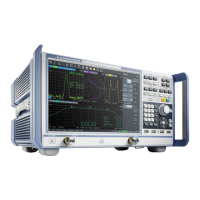Concepts and Features
R&S
®
ZNB/ZNBT
151User Manual 1173.9163.02 ─ 55
●
Manual reflection normalizations offer Complementary Match Standard Measure-
ments
●
Manual transmission normalizations support Complementary Isolation Measure-
ment (optional).
Complementary Match Standard Measurements
For reflection normalizations, the mandatory Open or Short measurements can be
complemented by optional Match measurements. Additionally, measuring a Match
standard allows you to eliminate errors due to the directivity of the internal couplers,
which improves the accuracy of reflection measurements on well-matched DUTs (high
return loss).
For reflection measurements on DUTs with low return loss, accuracy may be degraded
compared to a simple reflection normalization.
5.5.1.2 Reflection OSM Calibration
A reflection OSM (full one-port) calibration requires a Short, an Open and a Match
standard to be connected to a single test port. The three standard measurements are
used to derive all three reflection error terms:
●
The Short and Open standards are used to derive the source match and the reflec-
tion tracking error terms.
●
The Match standard is used to derive the directivity error.
A reflection OSM calibration is more accurate than a normalization but is only applica-
ble for reflection measurements.
5.5.1.3 One Path Two Ports Calibration
A one path two ports calibration combines a reflection OSM (full one-port) calibration
with a transmission normalization. The fully calibrated port is termed the node port.
This calibration type requires a Short, an Open and a Match standard to be connected
to a single test port plus a Through standard between this calibrated source port and
the other load ports. The four standard measurements are used to derive the following
error terms:
●
The Short and Open standards are used to derive the source match and the reflec-
tion tracking error terms at the source port.
●
The Match standard is used to derive the directivity error at the source port.
●
The Through standard provides the transmission tracking error terms.
For calibration of two ports, a one-path two-port calibration requires only four standards
to be connected (instead of 7 for a full two-port TOSM calibration). It is suitable when
only the forward (e.g. S
11
and S
21
) or reverse S-parameters (e.g. S
22
and S
12
) are nee-
ded, and if the DUT is well matched, especially at the load port.
Calibration

